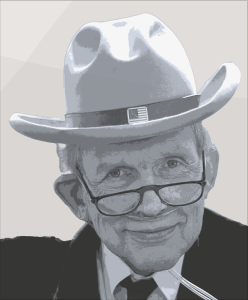
One of the most important pieces of Civil Rights legislation, the Americans with Disabilities Act, was signed into law on July 26, 1990. We want to honor the anniversary of that legislation by highlighting the work of Justin Dart Jr., a major contributor and one of the people that helped open the door for so many others.
Dart was born into a prominent family; his grandfather Charles R. Walgreen established the Walgreens drugstore chain. In 1948 he contracted polio, leaving him wheelchair-bound. He attended the University of Houston where his interest in civil rights began on campus. In 1952 he founded an organization to promote racial integration of the then-segregated university. This is also where he started getting active in the disability rights movement. In 1954 he earned undergraduate degrees in history and education, but the university refused to give him a teaching certificate because of his disability.
After starting several successful international businesses and advocating for disability rights overseas, Dart decided to dedicate himself entirely to the cause of human and disability rights. He and his family moved to Texas in 1974 and immersed themselves in local disability activism. From 1980 to 1985 Dart was a member, and then chair, of the Texas Governor’s Committee for Persons with Disabilities. His work in Texas became a pattern for what was to follow: extensive meetings with grassroots organizers, followed by a call for the radical empowerment of people with disabilities, followed by tireless advocacy.
In the 1980s, Dart began to spend more time advocating for disability rights in DC. He accepted an appointment from President Reagan to be the vice-chair of the National Council on Disability, where he served three terms. In 1986, Dart was appointed to head the Rehabilitation Services Administration (RSA), a $3 billion federal agency that oversees a vast array of programs for people with disabilities. Dart called for radical changes and for including people with disabilities in every aspect of designing, implementing, and monitoring rehabilitation programs. Resisted by the entrenched bureaucracy, Dart dropped a bombshell when he testified at a public hearing before Congress that the RSA was “a vast, inflexible federal system which, like the society it represents, still contains a significant portion of individuals who have not yet overcome obsolete, paternalistic attitudes about disability.” Dart was asked to resign his position after that hearing, and did so.
In 1989 Dart was appointed chair of the President’s Committee on the Employment of People with Disabilities, shifting its focus from its traditional stance of urging businesses to “hire the handicapped” to advocating for full civil rights for people with disabilities. After meeting with people with disabilities across the nation, Dart brought the stories he collected back to D.C., and began working towards legislation that is now known as the Americans with Disabilities Act (ADA). Upon receiving the information Dart collected, Senator Tom Harkin from Iowa worked with many other prominent leaders to author the ADA.
Sitting next to President Bush, Dart watched him sign the ADA into law on July 26, 1990, an anniversary that is celebrated each year by disability pride events all across the country. After the ADA was made law, he explained why it is so significant for people with disabilities:
“The ADA is a landmark commandment of fundamental human morality. It is the world’s first declaration of equality for people with disabilities by any nation. It will proclaim to America and to the world that people with disabilities are fully human; that paternalistic, discriminatory, segregationist attitudes are no longer acceptable; and that henceforth people with disabilities must be accorded the same personal respect and the same social and economic opportunities as other people.”
In 1998 Dart received the Presidential Medal of Freedom, the nation’s highest civilian award. “Justin Dart,” said President Clinton in 1996, “in his own way has the most Olympian spirit I believe I have ever come across.”
Dart died at the age of 71 on June 22, 2002. Justin Dart is an icon for the modern disability movement and the ideals of inclusion, advocacy, and leadership. In his final statement to the community upon his death, Dart wrote:
“I call for solidarity among all who love justice, all who love life, to create a revolution that will empower every single human being to govern his or her life, to govern the society and to be fully productive of life quality for self and for all.”